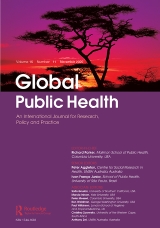Associate Professor Helle Samuelsen has contributed to the journal Global Public Health with the article ‘Balancing professional autonomy and authority at the margins of a fragile state: Front-line health workers’ experiences in Burkina Faso’.
 The article is co-written with Lea Pare Toe from the Institute for Research in Health Sciences in Burkina Faso and describes how front line health workers cope with difficult working conditions.
The article is co-written with Lea Pare Toe from the Institute for Research in Health Sciences in Burkina Faso and describes how front line health workers cope with difficult working conditions.
The availability of diagnostic equipment, medical products and basic infrastructure is limited in most low-income societies. Moreover poor motivation among health workers as well as recruitment and retention problems are key factors contributing to poor health care services in developing countries.
With data from anthropological fieldwork in two districts of Burkina Faso, which includes interviews with staff at dispensaries and medical centres, the authors find that while the health workers experience a certain degree of professional autonomy, their professional authority is constantly challenged when working at the margins of the state.
Through improvisations and bricolaging, they compensate for the many shortcomings, but many of them feel that their skills are waning and that their professional identity threatened. Thus, massive strengthening of the front-line health worker’s capacity is imperative for future improvement of health care services in Burkina Faso, the authors conclude.
Read the article (open access): Balancing professional autonomy and authority at the margins of a fragile state: Front-line health workers’ experiences in Burkina Faso
The study behind the article was a part of a larger collaborative research project, ‘Fragile Futures: Rural Lives in Times of Conflict’, supported by Danida, Denmark’s development cooperation under the Ministry of Foreign Affairs.
The work in Burkina Faso is continuing with the project 'Emerging Epidemics: Improving Preparedness in Burkina Faso', which seeks to identify key elements for a smart foresighting system for early detection of infectious diseases in order to reduce the risk of new international pandemics.
